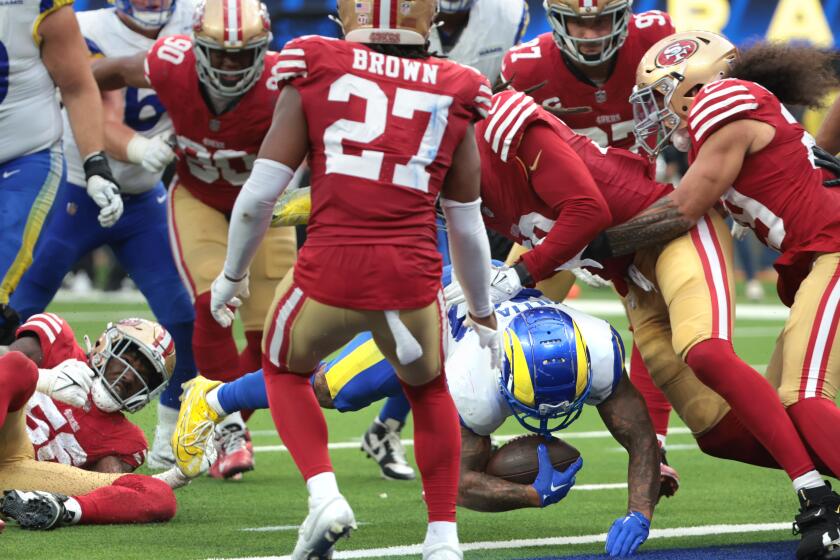Oklahoma loses all 2005 wins
The rich tradition of Oklahoma football now includes one of the most punishing losses in the history of the college game.
The Sooners lost an entire season of wins.
When the NCAA announced Wednesday that it was vacating all of Oklahoma’s wins from the 2005 season because three players accepted improper payments from a car dealer, the hallowed program took a historically uncommon hit.
The Sooners’ 8-4 season becomes 0-4. A come-from-behind win over Oregon in the Holiday Bowl? Never happened.
“It’s like the game was not played for them,” said Paul Dee, the Miami athletic director who serves on the NCAA infractions committee.
Erasing wins in a season can be even more damaging to a team’s image than reducing scholarships or other temporary sanctions, said Grant Teaff, executive director of the American Football Coaches Assn.
“It’s a penalty that goes on penalizing because it’s there every year,” Teaff said. “Fifty years from now, folks will look at the records and say, ‘What does that mean? What caused that?’ ”
The NCAA also put the Sooners on probation through 2010 because of previous violations by the basketball team. The football team will lose two scholarships for two years.
University administrators accepted the bulk of the decision but announced they would appeal the vacating of wins.
“Above all, we do not believe that erasing the 2005 season from the record books is fair to over 100 student athletes and coaches who played by the rules and worked their hearts out for a successful season that year,” Oklahoma President David L. Boren said in a prepared statement.
Coach Bob Stoops added that he “strongly supports” the appeal.
The Sooners have reason to hope for a reversal. The NCAA’s infractions appeals committee recently upheld sanctions against Georgia Tech but allowed the football team to keep its won-loss record intact.
Vacating wins is not common, especially in football, where the NCAA has tended to bar teams from bowl participation. But the penalty is hardly new.
The St. Joseph’s basketball team had its 1961 Final Four appearance vacated because of violations. The same happened with UCLA’s Final Four team in 1980.
More recently, the 1998 Southern Methodist football team and the 2002 NCAA champion Hawaii men’s volleyball team had their wins erased.
Oklahoma’s problems began in the summer of 2006, shortly before training camp, when it was discovered that quarterback Rhett Bomar, offensive lineman J.D. Quinn and walk-on Jermaine Hardison had been paid approximately $17,000 for work they never did at a Norman, Okla., car lot.
“As a regular practice, the two student-athletes clocked in for work, left the dealership, then returned later to clock out of work,” the NCAA said of Bomar and Quinn.
Investigators found that Hardison was paid for times when he was participating in a scrimmage and game.
The walk-on had previously been kicked off the team for rules violations. Bomar and Quinn were dismissed immediately.
The NCAA gave the program credit for taking such steps on its own, but not enough credit to avoid further penalties.
Vacation of record is not the same as forfeiture in that opponents who lost to Oklahoma cannot now claim victory.
And the Sooners do not have to return the money they received for appearing in the Holiday Bowl.
But future media guides and all other university files must show an 0-4 record -- the first officially winless season since the Sooners began playing football by losing their only game to Oklahoma City in 1895.
Those eight wins come off Stoops’ career record and Bomar loses the 2,018 yards and 10 touchdowns he passed for that fall.
Bomar and Quinn -- both of whom transferred to Division I-AA schools -- were ordered to repay the extra benefits to regain their eligibility.
The university has 15 days to notify the NCAA of its intent to appeal. Administrators said they would also contest an NCAA finding that the program failed to adequately monitor student-athlete employment.
“The loss of a season is something that lingers,” Teaff said. “That’s a pretty severe penalty.”
More to Read
Go beyond the scoreboard
Get the latest on L.A.'s teams in the daily Sports Report newsletter.
You may occasionally receive promotional content from the Los Angeles Times.











